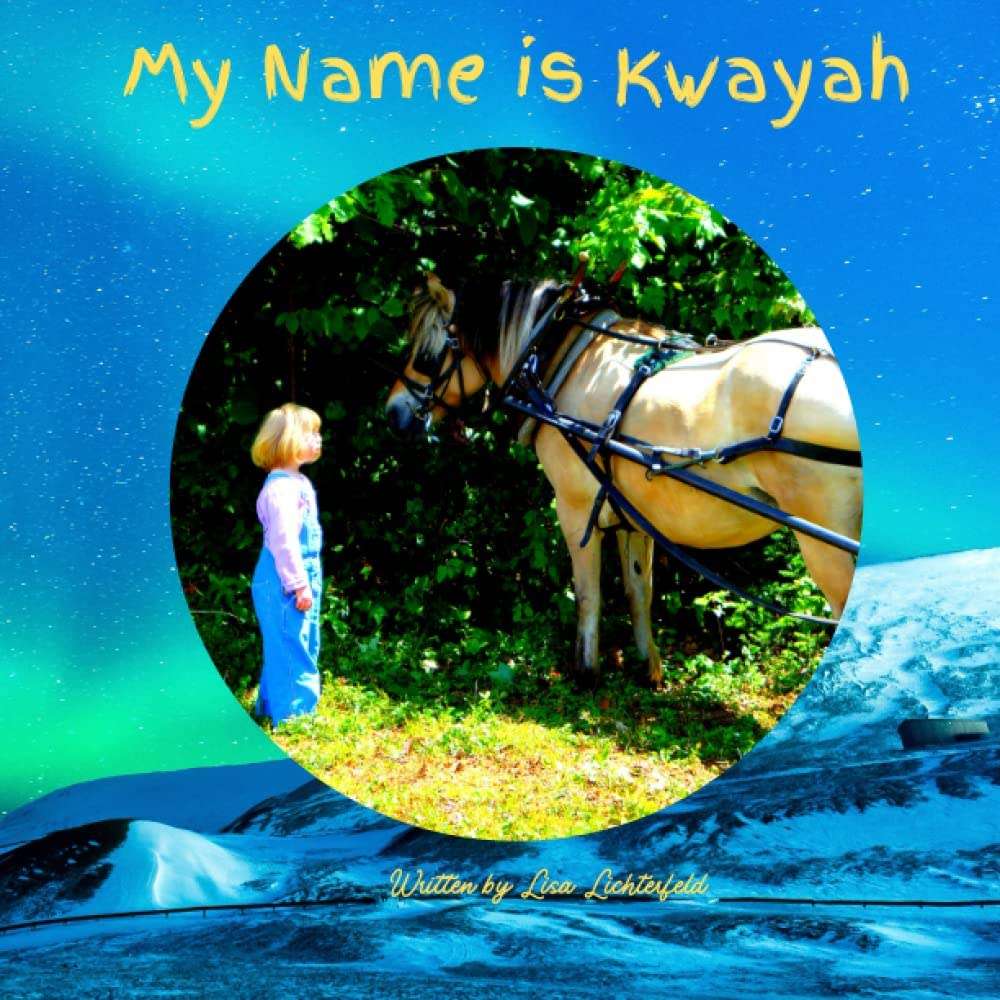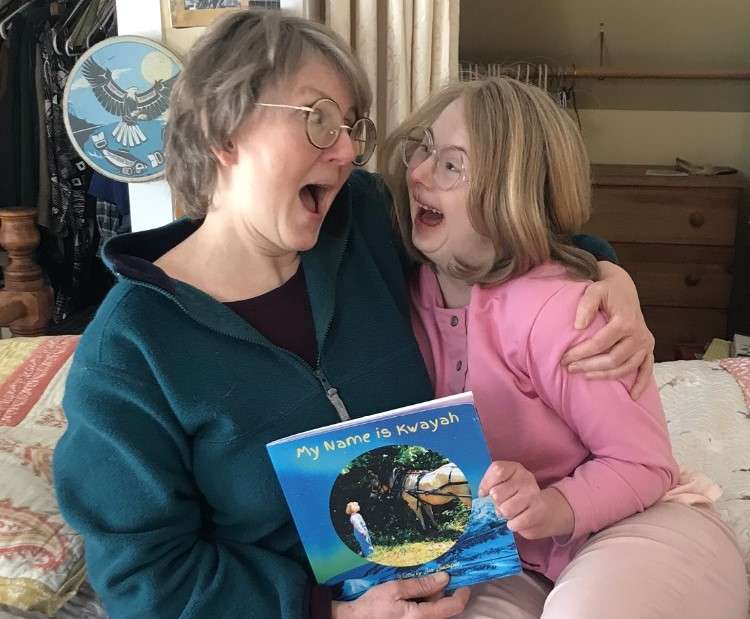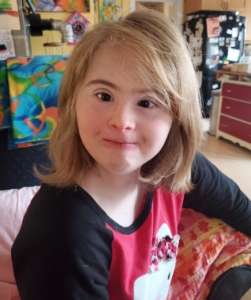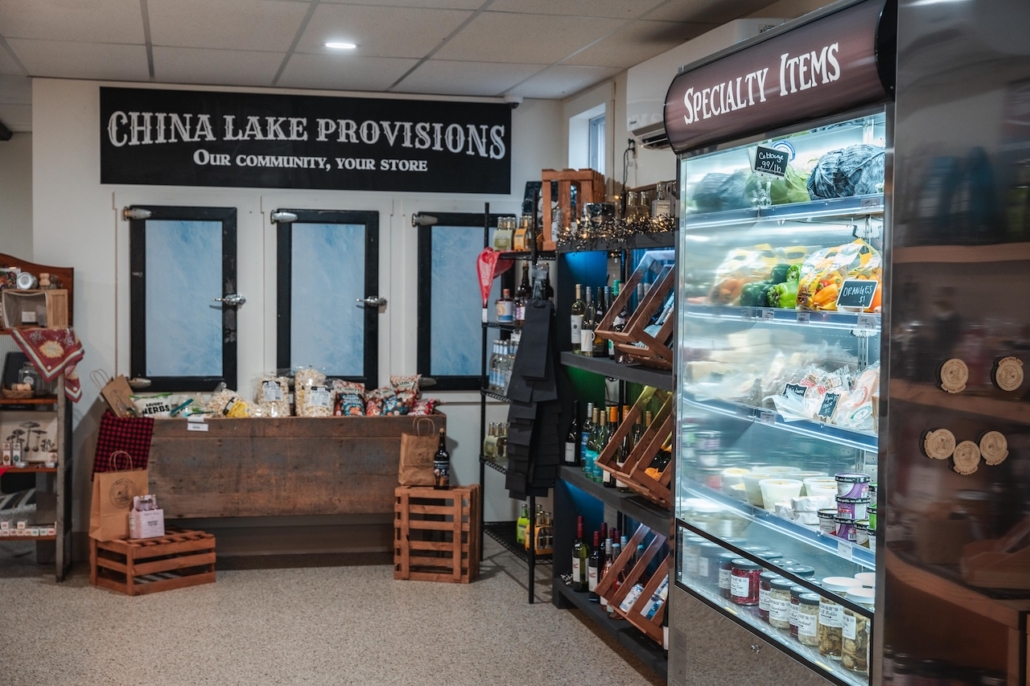Opening to receive the gift
Waterville Mom writes book redefining the term ‘Special Needs’
by Gillian Lalime
When asked about parenting, Lisa Lichterfeld, author of My Name is Kwayah, a children’s book about her daughter, starts with some self-analysis.
“I was the youngest of five. They say the youngest children tend to be more Bohemian. Some might even describe them as reckless and irresponsible. I tended to part ways with many conventions, and one could say there were more than a few misadventures in those departures. This resulted in two children born out of wedlock with different fathers, who chose not to participate in their children’s lives. When it became clear that my youngest had Down Syndrome, it felt like a judgment against me for all the poor choices I had made. Being a mother was the most important role in my life, and I felt a lot of guilt for the suboptimal conditions with which I had brought my son and daughter into the world.”
At the time of Kwayah’s birth and diagnosis, Lisa did not have any personal relationship with someone with Down Syndrome. Her learning curve took the form of an overwhelming amount of information explaining some frightening and unattractive qualities of the condition. “When you first find out, you are assailed with all of the possibilities of ailments your child is going to have: predisposition to hypothyroidism, speech difficulties, heart conditions, developmental delays, and more. This can be quite disheartening,” says Lisa. If you look up Down Syndrome, a majority of resources list challenges associated with the diagnosis.
However, when Kwayah was a year old something magical happened. A friend sent Lisa the book Expecting Adam, by Martha Beck, which is the true story of a spiritual awakening that takes place for a woman who is pregnant and finds out she is having a child with Down Syndrome. At the time Lisa finished reading the book, her daughter Kwayah started pointing at everything with the three fingers that sign “I love you” in American Sign Language. She had never been taught any sign language, but for the next year Kwayah’s hand identified everything around her with “I love you”. This marked the opening of Lisa’s eyes. She says, “Despite all of my failings, God had dropped a love bomb into my lap. From that point on, the blessings could no longer be disguised by whatever challenges appeared.”
When Kwayah turned 15, Lisa realized her daughter didn’t have any association with the words “Down Syndrome”. She thought it might be important for Kwayah to understand that she was born with this condition and know how it affects her. Lisa searched for books to see if there was anything that could aid the process of explaining Down Syndrome at a level Kwayah would be able to understand and relate to. Coming away from that search empty-handed, Lisa decided to write the book herself!
Part of Lisa’s process was to examine each quality that is different or would ordinarily fall into the category of deficit and ask: What is the strength or gift of this experience? Filled with family photos and colorful graphics, My Name is Kwayah is a children’s book that redefines the term “special needs” in a beautiful and thoughtful way. While the book is very specific to Kwayah, it explains that this condition is also called Trisomy 21, and the physical manifestations of it are related to the genetic variation of having a third 21st chromosome.
Before the book, Kwayah didn’t have any association with the words ‘Down Syndrome’. Now, she will sometimes quote directly from the book when talking to others! This book is written for anyone who would be positively impacted by a different vision of what Down Syndrome looks like, especially for families, teachers, and employers of someone living with Trisomy 21. It would be wonderful to have My Name is Kwayah in hospitals or at birthing centers, as a resource for birth workers caring for someone who perhaps unexpectedly has a baby with Trisomy 21, as was Lisa’s experience.
For this mother, there are two very important understandings.
First: Guilt gets in the way of seeing clearly.
Second: If you wear the glasses of “everything is coming together for my good”, you will always be looking for the good, and chances are you’ll find it!
It was through shifting her own perspective of Kwayah’s diagnosis that Lisa was able to embrace the gift she has been given by having a daughter born with special needs and special talents. This March marks the book’s one-year anniversary and celebrates World Down Syndrome Day, which falls annually on March 21. My Name is Kwayah can be found on Amazon or read at the Waterville Public Library.
Responsible journalism is hard work!
It is also expensive!
If you enjoy reading The Town Line and the good news we bring you each week, would you consider a donation to help us continue the work we’re doing?
The Town Line is a 501(c)(3) nonprofit private foundation, and all donations are tax deductible under the Internal Revenue Service code.
To help, please visit our online donation page or mail a check payable to The Town Line, PO Box 89, South China, ME 04358. Your contribution is appreciated!





I love this so much! I never knew any personal details of Lisa’s story but watching her with Kwayah when she would bring her to playgroups, I learned so much about patience, attentiveness, inclusion, and love. More so than I could have learned from my Early Childhood Ed experiences regarding kiddos with different abilities. I don’t think she will ever know the impact of parenting Kwayah has had and the ripple effects in my life have been pretty great! I’m excited to get the book!
What an amazing mother-daughter journey you are on!
Thank you, Lisa for writing such an important book and sharing your experience. We all need help in seeing all of life with new eyes.
Also Thank you, Gillian in bringing this book to our community’s attention.